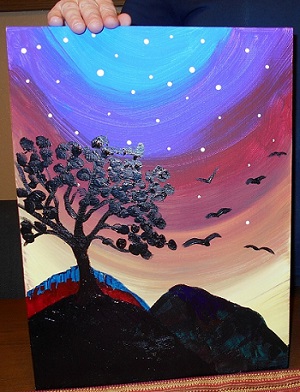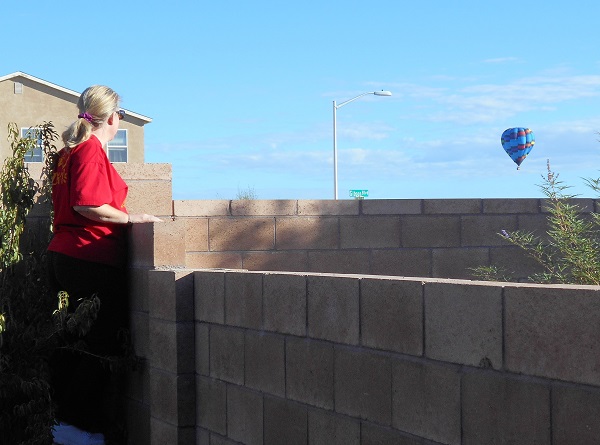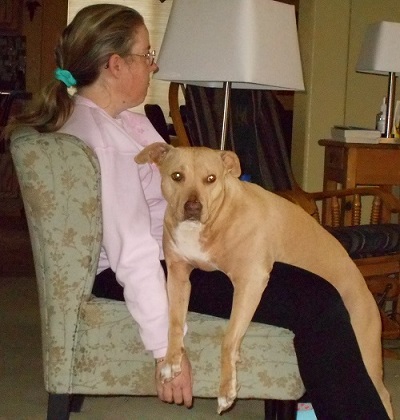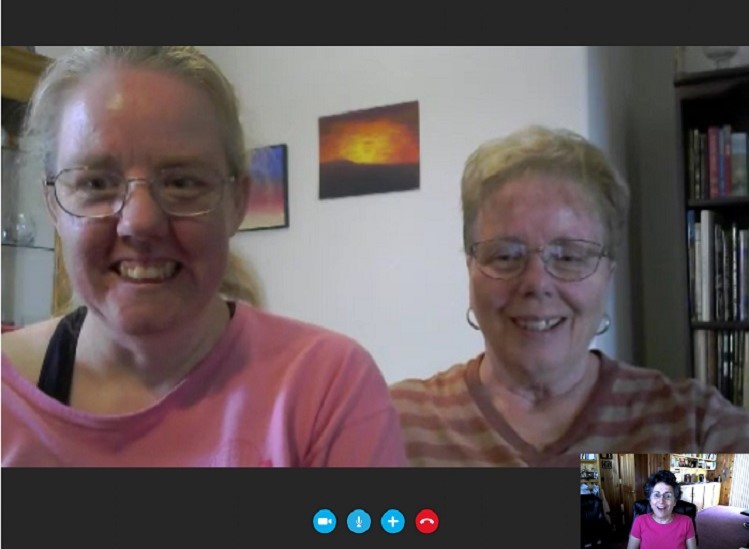Lyn Purser was born 46 years ago with intellectual disabilities. Born four months premature, she was placed on antibiotics shortly after birth. Five months later, she and her older brother left Italy for America with their parents. At age 14, she experienced a period of seizures that were inadequately controlled with medication. As a result, she suffered cognitive loss. At age 39, she was diagnosed with younger onset Alzheimer’s disease.
Her mom writes by email, “[Lyn] was born with brain damage and had challenges all her life. However, she doesn’t know she’s [disabled] as we didn’t use the term. She knows her brain is different from her brother or sister.”
Her Brain Is Different
Lyn and her family focus on her abilities, not disabilities. As a result, Lyn has grown into a happy adult who enjoys life and can have a conversation (sometimes hesitatingly and with uncertainty) about a myriad of topics.
Nineteen years ago, she and her mother worked while helping care for Helen’s mom in New Mexico where they live. Toward the end of a decade of care, Lyn explains that her grandmother “was getting very old and she told me to leave and don’t come back.” Helen, Lyn’s mother, explained that her mom’s personality changed toward the end and after she was diagnosed with Alzheimer’s. “Mom broke her hip and then her wrist and decided to stay in bed all day while expecting us to wait on her.”
During this time, Lyn was working at Wendy’s removing trays, cleaning tables, and checking the bathrooms. When asked why she left, she explains, “I wanted to retire and I’m never going back again.”
Not an Easy Road
One wouldn’t know the hard road this family has taken after spending a little time with them by phone and later, via Skype video. While Mom serves as the primary caregiver for her daughter, Lyn’s younger sister, Stephanie, keeps actively involved in her sister’s and Mom’s life from Virginia.
Four days a week, Lyn goes on outings with her respite provider and attends “day hab” (day habilitation), two days a week.
I appreciated Lyn’s willingness to give up “day hab” so we could talk, recently. While her mom stayed off to the side (at my request), Lyn and I talked about diverse topics. She was able to keep up with answers punctuated by “ums.” Occasionally and after I got too carried away with questions, she’d turn left to look at her mother for help. Helen exercised restraint and gave Lyn the opportunity to share.
Alzheimer’s diagnosis
Helen explains how Alzheimer’s came into their lives. “A single mother working two jobs? Each kid learned to do their laundry, since age 11. Lyn was able to do her own laundry and announced it each time. ‘Mom, I’m going to do my wash now.’ A moment later, I heard a blood-curdling scream. I didn’t hear anything drop or Lyn fall. When I got there, Lyn was staring at the washing machine as if it was an alien. She turned to me and in a panic said, ‘Mom, I don’t know what to do.’ When I pulled the knob to start filling it with water, Lyn jumped back in fear. I knew something was wrong.”
A series of neurological tests were inconclusive initially because the doctors refused to give Lyn a diagnosis of dementia due to her young age. A neurologist experienced with dementia caused by intellectual disabilities and Down’s syndrome confirmed the family’s suspicions. Stephanie, who has been writing a blog for seven years at Dementia Be Damned, wrote “A second evaluation by a clinician experienced with Alzheimer’s in the intellectually disabled, confirmed what we suspected for the past four years.”
That Sneaky Thief – Alzheimer’s
Like Brian LeBlanc who announced on Facebook that he had suddenly lost the ability to speak (fortunately he regained it), Lyn says, “I lost hearing in my left ear” as she points to her ear.
“How long ago?” I ask.
At first, she wasn’t sure. As we talked a while longer, Mom prompted her memory a bit, and she replied, “Three years ago.”
“How do you feel about it?” I asked. It’s much harder to adjust to sudden hearing loss as an adult than it is as a child when I was diagnosed with hearing loss.
She looks to her left for help as she tries to answer. “I feel good about it. I’ve been through testing… I asked my mom if it would ever come back and she said, ‘No, it won’t. It’s never gonna come back.’”
Likewise, she struggles with depth perception. “Mom is right behind me at all times.” She explains how her mom helps by telling her where to position her hands as she receives holy communion. Despite this lack of ability, she proclaims, “I can sense what’s going around me… I can feel.” Sadly, she no longer goes on outings with day habilitation. Her mom explains that without additional assistance it has become a safety issue for Lyn.
Alzheimer’s isn’t finished with her, yet. It’s now taking away her sense of smell.
Surprising Talent – Painting
Oftentimes, we learn about people diagnosed with dementia having talents they never had before. Nancy Nelson, also featured in VOICES with Dementia never wrote poetry and yet she’s had two books published of her poems. Lyn is no different. Her mother expresses shock, “She couldn’t even draw a straight line!”
Lyn explains, “I started painting in December. I never picked up a paint brush [before] last December.” When asked why she paints, she answers, “One, I didn’t have anything else to do… I like to do it, because it helps me to relax.”
Each painting is unique. She is inspired by Google images and even YouTube. “[Painting] helps me to figure out what I want to do. What’s the next picture? Another sunrise? A flower? A mountain?” She adds, “It’s from my heart [as she points to her head] and my mind [as she points to her heart].”
Her paintings are selling. She can’t keep up! They are stunning, like this one.
Advice – Do What Makes You Happy
At the end, I asked her a long multi-faceted question. She tried to answer it calmly and honestly as she had answered everything else during our 80-minute call. Helen helped her daughter understand by rephrasing the question.
“You just have to kinda live with it… we look for things to do to make us happy.” When asked what makes her happy, she replies, “Stephanie provides me joy. She’s going to come spend some time with me. I like to hang out with one of my brothers. [She has only one.] My uncle [she has several]… sometimes, Mom… some of Mom’s brothers.”
She likes watching hot air balloons rise each morning.

She loves bowling and visiting Hobby Lobby. She likes playing games and going on outings with her respite provider. “I like playing Hinkle.” I ask Lyn about this game as I look it up. Her mother comes to the rescue with “It’s not a game but the name of the local arcade.”
She loves seeing historic sites. “Quarai [part of the Salinas Pueblo Missions National Monument] is my favorite…peaceful and joyful. Nice picnic area… walk and see rattlesnakes and lizards.”
 She also likes playing with her four-year-old Pitbull mix, Nikki, a shelter rescue.
She also likes playing with her four-year-old Pitbull mix, Nikki, a shelter rescue.
While Lyn has lived in the U.S. for most of her life, her first five months in Italy must have had a lasting effect on her food preferences. When asked what her favorite foods are, she starts with Italian dishes such as lasagna and ends with spaghetti. “I don’t like meatloaf anymore,” she adds.
Stephanie, writing as LynsSis, is a dedicated and informed blogger. Having written some 1,300 posts at Dementia Be Damned over the past seven years, she aims to raise awareness of intellectually disabled people diagnosed with dementia. Her site also provides resources for her mom some 1,800 miles away. You’ll find “Dementia and Brain Related Links” and “Caregiver Resources” along the right margin of her website.
Thanks to Caring.com, where I discovered Dementia Be Damned in 10 Dementia Blogs You Should Be Reading. [TCV Update 9/4/2018: Original Link broken – now linked to web archive]









